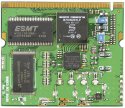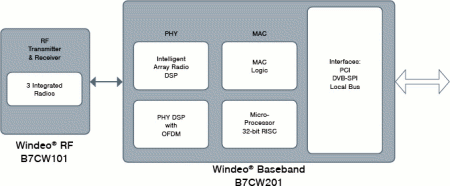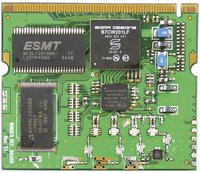UWB design kit targets Linux-based hi-def A/V gadgets
Jan 10, 2007 — by LinuxDevices Staff — from the LinuxDevices Archive — 2 views Sigma Designs is shipping an “all-in-one” reference design for UWB (ultra-wideband) network devices compliant with WiMedia Alliance standards. The Mini-PCI Windeo Reference Design Kit includes Linux drivers, and targets digital entertainment products that wirelessly distribute high-definition… (HD) audio/video content at resolutions up to 1080i.
Sigma Designs is shipping an “all-in-one” reference design for UWB (ultra-wideband) network devices compliant with WiMedia Alliance standards. The Mini-PCI Windeo Reference Design Kit includes Linux drivers, and targets digital entertainment products that wirelessly distribute high-definition… (HD) audio/video content at resolutions up to 1080i.
Sigma's Windeo Kit is based on its Windeo UWB chipset, which comprises a “B7CW201” baseband and “B7CW101” RF chip, both fabbed on a CMOS (complementary-symmetry metal-oxide-semiconductor) process. The chips are said to comply with the WiMedia Alliance's Multi-band OFDM (MBOA) PHY v1.1 and MAC v1.0 specifications.

Sigma's UWB chipset block diagram
(Click to enlarge)
 Sigma's UWB miniPCI reference board (Click to enlarge) |
Sigma's Windeo Kit also includes a mini-PCI card based on the Windeo chipset. The card comes with schematics, a bill-of-materials, and Linux drivers. And, the kit includes an IP (Internet protocol) stack said to comply with the WiMedia Alliance's WiMedia Networking (WiNET) specification.
Hung Nguyen, GM of wireless products at Sigma, stated, “The WiMedia Alliance's PHY, MAC and WiNET specifications are today considered a defacto standard for Ultra Wideband (UWB) wireless communication. Sigma offers a total solution, including wireless chipset, reference design board, software, and media processor chip.”
Availability
The Windeo UWB Mini-PCI reference design and SDK is available now.
Sigma is demonstrating the product in a private suite at the Hilton at the CES show this week in Las Vegas. The demonstration involves 1080i HD video streaming, and also uses Sigma's 8622L media processor board.
This article was originally published on LinuxDevices.com and has been donated to the open source community by QuinStreet Inc. Please visit LinuxToday.com for up-to-date news and articles about Linux and open source.